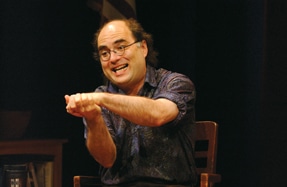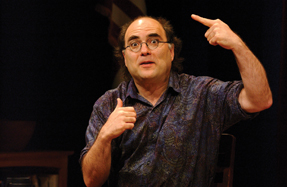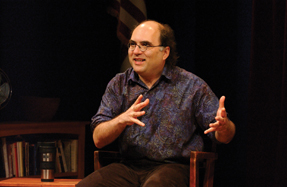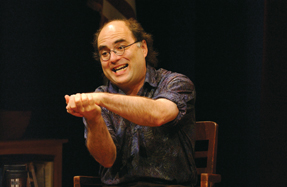Life
Red Diapers in the Land of Red Chillies

I’ve always admired the American education system — particularly at the university level — for the intellectual freedom it gives students. But even for an ardent fan, this case borders on the bizarre. Back in 1980, a young political science undergraduate student at Princeton University completed every academic requirement to graduate, except one: his “senior thesis.” Here comes the bizarre part. A quarter century later, the same student — now a flabby middle-aged stand-up comedian living on the West Coast — tracks down his old advisor and seeks his permission to complete that thesis in the form of a stand-up comic act recounting the student’s myriad “explorations of democracy” in the real world of everyday politics. And guess what? He gets the advisor’s go-ahead!
Contrast this with the experience of an Indian student who graduates with a bachelor’s degree in science in the mid-1970s from the University of Bombay, regarded then as India’s premier educational institution. Soon thereafter, he decides to become a journalist and writer, and so seeks to enroll in the university’s master’s program in English. No way, say the varsity bigwigs. He is told he’d have to redo an entire four-year bachelor-of-arts program in an affiliated college before qualifying for enrollment in the MA program. I should know about this case: it was my own. It was thus an evening of Indo-US cultural contrasts as Josh Kornbluth unfolded his senior thesis “Citizen Josh” on the campus of University of Mumbai (yes, the same except for a name-change) during his late summer tour of six Indian cities — Chennai, Kochi, Bangalore, Kolkata and New Delhi, apart from Mumbai. First, the venue itself. Imagine the delicious irony of presenting this long overdue Princeton thesis in the garb of a stand-up comic act in an Indian university still imprisoned in archaic British rules and an examination system that emphasizes rote and recall over innovation and insight. Kornbluth, be warned: you’d be hounded out of reckoning as a bad example for impressionable minds if you attempt anything remotely similar with the professors at Mumbai U. Second, Kornbluth’s sponsor—the American Center, which is part of the U.S. Consulate. Imagine a government that has been historically and viscerally anti-Communist funding a self-confessed “child of Communist Jewish parents” to travel across a strategically sensitive country like India to speak to audiences on political issues! Phew. True, Kornbluth never claims to be a communist himself and, in fact, hardly ever uses the “C” word during his performance. But neither does he at any point run down the ideology and, more importantly, he expressly includes it in his published backgrounder. The political history of the United States is littered with antipathy toward communism, through the Red Scare, Sen. Joseph McCarthy’s ruinious attacks on alleged Communists in America and the blanket blacklisting of Cuba. In the 1980s, Pres. Ronald Reagan revelled in calling the Soviet Union an Evil Empire.
I recall my years as a graduate student on an American campus in the early and mid-1980s. Left-leaning intellectuals were forced — for sheer survival — to denounce Communism at every available forum so they would be seen as being, at worst, just pinkish liberal, but never Commie-red. So damning was its impact that even the mention of the “C” word was taboo, as if its utterance would somehow vitiate the air in the room. And now look at Kornbluth’s list of stand-up acts. One of them — written and performed circa 2004 — is actually called “Red-Diaper Baby” no less, and is reportedly his “meditation on growing up as the child of Communist parents.” Is this a sign of profound change in the American political establishment’s psyche, a change as radical as — and piquantly linked to — the election of a Black president in a predominantly white country? Or, looked at more sceptically, another example of the genius of any well-run establishment to co-opt rebels? Significantly, Kornbluth blogs about a James Dean poster in the Chennai consulate. That should have set off an alarm bell or two — Dean was a Hollywood rebel, if ever there was one — or at least got him to introspect, but Kornbluth lets its political significance pass unquestioned. That’s really not Kornbluth’s fault though. It’s an endemic shortcoming among Americans at large. Curiously for a people who hop out of matrimony at the drop of underwear, their political system has for long become the equivalent of a solid monogamous marriage: place for two and no more. A third presidential candidate is perennially the “other man” — a political adulterer. As a result, Ross Perot and, more recently, Ralph Nader remain at best spoilers, violating the creaseless process of electoral politics, out of step with the established choreography of the leap-year ballot opera, best kept out of even presidential debates.
What does all this tell you about the American system? That its political spectrum is so pathetically narrow that it limits the options for voters. And that its adherents therefore appear naive and simplistic when they talk about their political experiences to people in a country as ideologically complex and culturally nuanced as India. “Citizen Josh,” in the words of its creator, is about democracy — or more specifically, one rather passive person’s serendipitous journey into political activism. At 50, Josh Kornbluth finds himself largely of his own volition in the camp of “small-d democrats.” This would imply that his affiliations rise beyond mere political-party confines, but does it also point to a willingness to think out of the existing political box? I have my doubts. Look at the issues Kornbluth talks about in his stand-up act: grass-root protests involving his local playground, state education funding, and global warming. The more dramatic moments in his stand-up act all have to do with the mechanics of staging a protest, hinting nowhere at the ideology behind it. Perhaps that’s the inbuilt tyranny of middle-brow comedy. And when it gets thin on substance, Kornbluth resorts to the old trick of dragging in a cute irrelevancy — recounting how his father saved his prematurely born incubator-bound brother in the hospital by the simple act of holding him close to his own body. A triumph of the personal touch over the impersonal machine no doubt, but in retrospect a rather disingenuous ploy to exploit the audience’s emotions. The real trouble with “Citizen Josh” is, I reckon, generational. Kornbluth Sr, assuming he was more than an armchair communist in his prime, probably had more riveting stuff for us Indians than his son brought with him. Josh Kornbluth represents the shift — or is it descent? — over successive generations of Left-oriented Americans (do we call them “reformed” Commies?) from an ideological conscience to a civic one, from actively participating in the anti-Vietnam protests and the Civil Rights movement to joining the Sierra Club and initiating a recycling project in the neighborhood. Not that the latter are acts to be ashamed of. Far from it: they form the essence of grass-root democracy. It’s just that an Indian audience — not unfamiliar with its right to information and other rights in the public domain, and also exposed to wide-ranging media outlets — would hold not just George W. Bush but the whole of America culpable for that country’s cynical adventurism in Iraq. And would therefore view a political commentator’s exclusion of such topics from a self-avowedly “political” stand-up routine with an archly raised eyebrow. Another problem concerns the audience. For reasons of logistical convenience, Kornbluth performed in six Indian metro cities in front of largely invited audiences. And, I learn, even practised his act on the local consulate staff — both American and Indian — before public delivery. No wonder, he went away with a false sense of having connected with the locals. It was the wrong sample of the Indian population’s cross-section: he was preaching to the polite and the converted. In a television interview with Kornbluth, Prof Robert Reich, former Labor Secretary in the Bill Clinton administration who now teaches at Berkeley, pointed out — although in another, albeit related, context — the danger inherent in such self-congratulation. The Berkeley community, he said, was wonderful, but it lived in a bubble: there’s a larger community out there in the rest of the country. At the end of his India trip, Kornbluth — who wrote a delightfully spicy blog on his travels — would have known something a lot of home-bound Americans are apt to overlook: there’s an even larger community out there, and it’s called the rest of the world. |




You must be logged in to post a comment Login